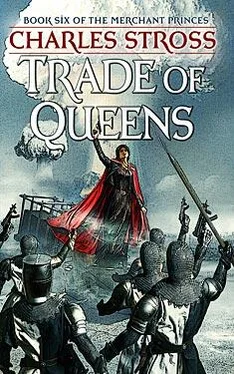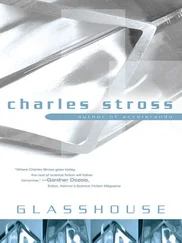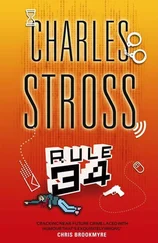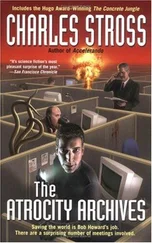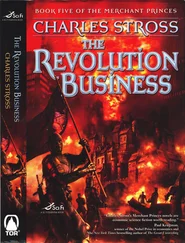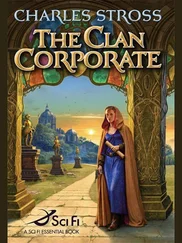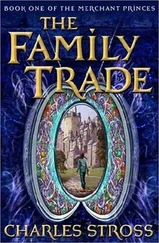Charles Stross - MP 6 -The Trade of Queens
Здесь есть возможность читать онлайн «Charles Stross - MP 6 -The Trade of Queens» весь текст электронной книги совершенно бесплатно (целиком полную версию без сокращений). В некоторых случаях можно слушать аудио, скачать через торрент в формате fb2 и присутствует краткое содержание. Жанр: Старинная литература, на английском языке. Описание произведения, (предисловие) а так же отзывы посетителей доступны на портале библиотеки ЛибКат.
- Название:MP 6 -The Trade of Queens
- Автор:
- Жанр:
- Год:неизвестен
- ISBN:нет данных
- Рейтинг книги:4 / 5. Голосов: 1
-
Избранное:Добавить в избранное
- Отзывы:
-
Ваша оценка:
- 80
- 1
- 2
- 3
- 4
- 5
MP 6 -The Trade of Queens: краткое содержание, описание и аннотация
Предлагаем к чтению аннотацию, описание, краткое содержание или предисловие (зависит от того, что написал сам автор книги «MP 6 -The Trade of Queens»). Если вы не нашли необходимую информацию о книге — напишите в комментариях, мы постараемся отыскать её.
MP 6 -The Trade of Queens — читать онлайн бесплатно полную книгу (весь текст) целиком
Ниже представлен текст книги, разбитый по страницам. Система сохранения места последней прочитанной страницы, позволяет с удобством читать онлайн бесплатно книгу «MP 6 -The Trade of Queens», без необходимости каждый раз заново искать на чём Вы остановились. Поставьте закладку, и сможете в любой момент перейти на страницу, на которой закончили чтение.
Интервал:
Закладка:
Fowler shrugged. "It can be done, but it'll cost you," he said bluntly. "There's a new interrogation and processing block scheduled for development on Long Island. Or I could do you a prison hulk."
"A prison hulk?" Reynolds's eyes lit up: "Capital! That would be just the ticket!" After the initial shock, he'd paid close attention to Cheung's sales pitch—and spent time in subsequent meetings attempting to deduce the limitations of the world-walkers' abilities. A steam yacht with decent owner's quarters and a train with sleeping car were already on his department's budget—officially to make it easier for the commissioner for internal security to travel safely between offices, unofficially to insure his safety against world-walking killers. "Do you have anything offshore near the Massachusetts coastline? Preferably with an antimutiny plug?" (Explosive scuttling charges had proven a most effective tool in preventing prison mutinies under the ancien regime.)
"I think something along those lines can be provided." Fowler pulled out a notebook. "How many berths do you need, and when and where will the arrests take place?"
"Number: unknown, but not more than a thousand at the absolute maximum. More likely under a hundred in the first instance, then a flow of stragglers for processing. Somewhere within a couple of hours of Boston. To be moored in deep water—not less than thirty feet beneath the keel—and not less than a mile offshore. If you could set it up within the next two days I would be eternally grateful . . . ?"
"I'll see what we can do." Fowler put his notebook away. "I take it the detainees are, er, disposable?"
"If necessary." Reynolds nodded.
"I didn't hear that," Jennings said fastidiously.
"Of course not."
"Jolly good, then." Jennings stood. "I'll see that a circuit tribunal under Star Rules is at your men's disposal in Boston two days hence. Now if you don't mind, I have a dreadful pile of paperwork to catch up on . . . ?" He sighed. "These wreckers and subversives! I swear we're going to run out of rope before they're all hanged."
The fortified great house had seen better days: Its walls were fire-scorched, half the downstairs windows were bricked up, the hastily applied mortar still weeping salts across the stone blocks of its facade, and the stable doors had been crudely removed. But it was still inhabitable—which counted for something—and the ten-meter radio mast sprouting from the roofline made it clear who its inhabitants must be.
"You wanted to see me, sir."
The office on the second floor had once been a squire's wife's boudoir; it still smelled faintly of rosewater and gunpowder. The bed had been broken up for firewood and scrap, used to reinforce the shutters during the brief siege, and today the room was dominated by a green folding aluminum map table.
"Yes. Come in, sit down, make yourself comfortable. I've got Pepsi if you need a drink."
"That would be wonderful, sir."
Rudi sat tensely on the narrow edge of the camp chair while Earl-Major Riordan poured him a mug of foaming brown cola with his own hands. The lack of a batman did not escape his notice, but if Riordan wanted to preserve the social niceties . . .
It must be bad news,
he decided, a hollowness below his ribs waiting to be filled by the exotic imported beverage.
"I want to pick your brains about aircraft," Riordan said stiffly. "Think of this as an informal brainstorming session. Nothing we discuss is for ears beyond this room, by the way."
Really?
Rudi leaned forward. "Brainstorming, sir?"
Riordan sighed. "Her Majesty"—he paused, and poked at a paper on his desk—"has written me a letter, and you're the man to answer it." He looked slightly pained, as if his lunch had disagreed with his digestion.
"Sir."
"You know about the
British."
They spoke hochsprache. "She is talking to them. She wants an aircraft. Something that can be built for them within two years and that outstrips anything they can imagine. Something for war."
"To be built
there?"
Rudi shook his head. "I thought they were stuck in the steam age?"
"They have aircraft. Two wings, spaced above each other like so"—Riordan gestured—"slow, lumbering things. Made of wood and sailcloth."
"Really?" Rudi perked up. "And Her Majesty wants to build something better? What for?"
"They've got a war on." Riordan finally sat down in the chair opposite, and Rudi relaxed slightly. "The French are blockading them, there is a threat of bombardment from aerial tenders offshore. I told her to give the
British
something for their navy, one of those submarines—you've seen
Das Boot?
no?—but she says ships take too long. They understand not to expect too much of aircraft, so build something revolutionary." He took a deep breath. "Give me an eagle's view. What should I be asking?"
"Huh." Rudi rubbed his chin. It was itching; he hadn't had a chance to shave for three days, scurrying hither and yon trying to arrange bodies to haul across the ultralight parts he'd been buying. "What engines do they have? That's going to limit us. And metallurgy. Electronics . . . I assume they've got vacuum tubes? It'll have to be something from the nineteen-forties. A warbird. Two engines for range, if it's going offshore, and it needs to be able to carry bombs or guns." He paused. "You know a plane on its own isn't going to do much? It needs tactical doctrine, pilot training, navigation tools and radar if they can build it, ideally an integrated air defense—"
Riordan waved an impatient hand. "Yes, that's not the point. We need what Her Majesty calls a
technology demonstrator."
"Can they do aluminum engine blocks?" Rudi answered his own question: "Maybe not, but aluminum goes back to the nineteenth century—we can work on them. Hmm. Engines will be a bottleneck, but . . . P-38? No, it's a pure fighter. Hard to fly, too. If they're still doing wood—" He stopped.
"Wood?" Riordan frowned.
"We'd need to work out how to produce the engines, and we'd need modern epoxy glues instead of the shit they had back then, but. But." Rudi shook his head. "I think I know what you want," he said.
"Do you?"
"The de Havilland Mosquito. The British built tons of them during the war, kept them flying until the nineteen sixties—it was originally a fast two-seat bomber, but they hung guns on it and used it as a fighter too. Made out of plywood, with two Merlin engines—they were a nineteen-thirties design, so the metallurgy might be up to it. Long range, fast; if they're still using biplanes it'll run rings around anything they've seen. If the metallurgy is better and quality control is up to it, I'd go for the P-51D, the Mustang. Faster, single-engined, similar range, more maneuverable. But for a first cut, I'd go for something made of wood with two engines. Safer that way."
Riordan nodded slowly. "Could you build one?"
"Could." Rudi carefully placed his half-full mug on the map table. He tried not to exhale Pepsi.
"Build
one?"
"For the British." Riordan wasn't smiling. "With unlimited resources, but a knife over your head."
"Urk." Rudi thought for a while. "Maybe. But I'd hedge my bets."
"How?"
"I'd start by talking to their existing aircraft designers. And bring the biggest damn library of metallurgy, electronics, materials, and aerodynamics textbooks I can find. The designs for those nineteen-forties warbirds—you can buy them on eBay for a couple of hundred dollars—CD-ROMs with just about everything on them, technical manuals, patents, blueprints, everything. But you'll probably take longer to build an exact replica of one from the blueprints than it would take a clued-up manufacturer on a war footing to invent a new one and build it from scratch. Much better to grab all the textbooks and histories, copies of
Читать дальшеИнтервал:
Закладка:
Похожие книги на «MP 6 -The Trade of Queens»
Представляем Вашему вниманию похожие книги на «MP 6 -The Trade of Queens» списком для выбора. Мы отобрали схожую по названию и смыслу литературу в надежде предоставить читателям больше вариантов отыскать новые, интересные, ещё непрочитанные произведения.
Обсуждение, отзывы о книге «MP 6 -The Trade of Queens» и просто собственные мнения читателей. Оставьте ваши комментарии, напишите, что Вы думаете о произведении, его смысле или главных героях. Укажите что конкретно понравилось, а что нет, и почему Вы так считаете.
